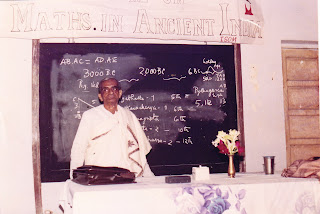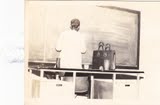PROF. M. C. CHAKI
and
M. C. Chaki Centre for Mathematics and Mathematical Science, Calcutta
Prof. M. C. Chaki (full name: Prof. Manindra Chandra Chaki),
was born in 1913 on the 1st of July at The town of Bagura, now
in Bangladesh.
School education:
(i) Jamalpur Govt. School, Mymensingh (Bangladesh).
(ii) Gaibandha High School, Rangpur (Bangladesh).
He matriculated in 1930 from Gaibandha high School.
College education:
(i) Bangabasi College, Calcutta (I.Sc.) during 1930-1932.
(ii) Rajshahi Govt. College (B.A.) during 1932-1934 with
Mathematics (Hons.) and Sanskrit (Pass).
University education: Got his M.A. degree in Pure Mathematics
from Calcutta University in the year 1936.
Service life:
(i) Lecturer in Mathematics, Bagura College (1939-1945).
(ii) Lecturer in Mathematics, Bangabasi College, Calcutta (1945-1952).
(iii) Lecturer in Pure Mathematics dept. of Calcutta University (1952-1960).
(iv) Reader in Pure Mathematics dept. of Calcutta University (1960-1972).
(v) Sir Ashutosh Birth Centenary Professor of Higher Mathematics (1972-1978).
Cebrated Research Papers:
1. On a non-symmetric harmonic space (Bull. Cal. Math. Soc., 1952). In this paper the
example of an n-dimensional simply harmonic space is given, which is not
symmetric. The paper was of special importance because it was published at a time
when there prevailed various conjectures in this regard. Due to this reason the paper
has found reference in the book "Harmonic spaces" by A.G.Walker and H.S.Ruse.
2. On conformally symmetric spaces (Ind. Journal of Maths., 1963). This paper had great
impact on the research workers of differential geometry. The Polish and the Japanese
schools, which are the most active schools in differential geometry subsequently
published a large number of papers on this type of space. Recently this type of space
has been found to be useful in general relativity. Some important contributions have
been made on this type of relativistic manifold by research workers in U.S.A., U.K.,
Canada, Russia, Belgium and other countries.
3. On pseudo symmetric manifolds (Anatele' Stint Univ. Al Cuza Iasi, 1987). In this
paper a new type of differential geometric structure called Pseudo symmetric structure
was introduced. An n-dimensional manifold with this structure is denoted by (PS)n. In
literature this has been reffered to as a Chaki (PS)nor briefly a Chaki manifold. Some
important contributions have already been made in Hungary and Jugoslavia dealing0
PROF. M. C. CHAKI
and
M. C. Chaki Centre for Mathematics and Mathematical Science, Calcutta
Prof. M. C. Chaki (full name: Prof. Manindra Chandra Chaki),
was born in 1913 on the 1st of July at The town of Bagura, now
in Bangladesh.
School education:
(i) Jamalpur Govt. School, Mymensingh (Bangladesh).
(ii) Gaibandha High School, Rangpur (Bangladesh).
He matriculated in 1930 from Gaibandha high School.
College education:
(i) Bangabasi College, Calcutta (I.Sc.) during 1930-1932.
(ii) Rajshahi Govt. College (B.A.) during 1932-1934 with
Mathematics (Hons.) and Sanskrit (Pass).
University education: Got his M.A. degree in Pure Mathematics
from Calcutta University in the year 1936.
Service life:
(i) Lecturer in Mathematics, Bagura College (1939-1945).
(ii) Lecturer in Mathematics, Bangabasi College, Calcutta (1945-1952).
(iii) Lecturer in Pure Mathematics dept. of Calcutta University (1952-1960).
(iv) Reader in Pure Mathematics dept. of Calcutta University (1960-1972).
(v) Sir Ashutosh Birth Centenary Professor of Higher Mathematics (1972-1978).
Cebrated Research Papers:
1. On a non-symmetric harmonic space (Bull. Cal. Math. Soc., 1952). In this paper the
example of an n-dimensional simply harmonic space is given, which is not
symmetric. The paper was of special importance because it was published at a time
when there prevailed various conjectures in this regard. Due to this reason the paper
has found reference in the book "Harmonic spaces" by A.G.Walker and H.S.Ruse.
2. On conformally symmetric spaces (Ind. Journal of Maths., 1963). This paper had great
impact on the research workers of differential geometry. The Polish and the Japanese
schools, which are the most active schools in differential geometry subsequently
published a large number of papers on this type of space. Recently this type of space
has been found to be useful in general relativity. Some important contributions have
been made on this type of relativistic manifold by research workers in U.S.A., U.K.,
Canada, Russia, Belgium and other countries.
3. On pseudo symmetric manifolds (Anatele' Stint Univ. Al Cuza Iasi, 1987). In this
paper a new type of differential geometric structure called Pseudo symmetric structure
was introduced. An n-dimensional manifold with this structure is denoted by (PS)n. In
literature this has been reffered to as a Chaki (PS)nor briefly a Chaki manifold. Some
important contributions have already been made in Hungary and Jugoslavia dealing 0
PROF. M. C. CHAKI
and
M. C. Chaki Centre for Mathematics and Mathematical Science, Calcutta
Prof. M. C. Chaki (full name: Prof. Manindra Chandra Chaki),
was born in 1913 on the 1st of July at The town of Bagura, now
in Bangladesh.
School education:
(i) Jamalpur Govt. School, Mymensingh (Bangladesh).
(ii) Gaibandha High School, Rangpur (Bangladesh).
He matriculated in 1930 from Gaibandha high School.
College education:
(i) Bangabasi College, Calcutta (I.Sc.) during 1930-1932.
(ii) Rajshahi Govt. College (B.A.) during 1932-1934 with
Mathematics (Hons.) and Sanskrit (Pass).
University education: Got his M.A. degree in Pure Mathematics
from Calcutta University in the year 1936.
Service life:
(i) Lecturer in Mathematics, Bagura College (1939-1945).
(ii) Lecturer in Mathematics, Bangabasi College, Calcutta (1945-1952).
(iii) Lecturer in Pure Mathematics dept. of Calcutta University (1952-1960).
(iv) Reader in Pure Mathematics dept. of Calcutta University (1960-1972).
(v) Sir Ashutosh Birth Centenary Professor of Higher Mathematics (1972-1978).
Cebrated Research Papers:
1. On a non-symmetric harmonic space (Bull. Cal. Math. Soc., 1952). In this paper the
example of an n-dimensional simply harmonic space is given, which is not
symmetric. The paper was of special importance because it was published at a time
when there prevailed various conjectures in this regard. Due to this reason the paper
has found reference in the book "Harmonic spaces" by A.G.Walker and H.S.Ruse.
2. On conformally symmetric spaces (Ind. Journal of Maths., 1963). This paper had great
impact on the research workers of differential geometry. The Polish and the Japanese
schools, which are the most active schools in differential geometry subsequently
published a large number of papers on this type of space. Recently this type of space
has been found to be useful in general relativity. Some important contributions have
been made on this type of relativistic manifold by research workers in U.S.A., U.K.,
Canada, Russia, Belgium and other countries.
3. On pseudo symmetric manifolds (Anatele' Stint Univ. Al Cuza Iasi, 1987). In this
paper a new type of differential geometric structure called Pseudo symmetric structure
was introduced. An n-dimensional manifold with this structure is denoted by (PS)n. In
literature this has been reffered to as a Chaki (PS)nor briefly a Chaki manifold. Some
important contributions have already been made in Hungary and Jugoslavia dealing
with such manifolds. Recently this type of manifold has been used in general
relativity. A paper of Prof. Chaki with one of his students dealing with such a
relativistic space-time has been published in the International Journal of Theoretical
Physics (IJTP, 1996).
4. On quasi Einstein manifolds (Publicationes Mathjematicae,Debrecen,2000). This
paper is the fruit of Prof. Chaki's continous research on relativistic manifolds. In this
paper the Ricci tensor has a structure that reduces to the usual Einstein manifold
structure in a special case. An n-dimensional manifold with this type of structure is
denoted by (QE)n. Such type of manifolds are found to be useful for studying perfect
fluid spacetimes of general relativity. In his quest for studying other types of fluid
spacetimes, Prof. Chaki has subsequently generalized the concept of (QE)n and the
work has been published in Publicationes Mathematicae, Debren in the year 2001. He
is currently working on further generalization of such type of spacetimes.
Honours and Distinctions:
A 'Teacher of Eminence' of the University of Calcutta, Prof. Chaki is aqmember of
the Editorial Board of the internationally reputed journal 'TENSOR'. A geometer of
international fame, he is at present not only the seniormost active mathematician of India
but is probably one of a few senior active mathematicians of the world.
It is remarkable that even at the age of 90 he continues to guide research, inspire
students of mathematics ande participate in various activities meaqnt to widen the scope
of mathematics. Currently a research project sanctioned by the Govt. of India is running
under his advice at the Calcutta Mathematical Society.
M. C. Chaki Centre for Mathematics and Mathematical Sciences:
This centre, with the purpose of advancement of mathematics teaching, learning and
research was set up by the students and admirers of Prof. M.C.Chaki and was named after
him as a mark of respect to him. The centre3 was officially inaugurated on July 13, 1996
at the Vidyasagar hall of Asiatic Society, Calcutta. The centre is currently housed at its
office at 8 Jadav Ghosh Road, Calcutta.
Among the various objects of the centre, a few are as follows:
1. To promote pedagogic and other research in Mathematics and Mathematical Sciences.
2. To publish a Journal containing research articles on Mathematics and Mathematical
Sciences.
3. To arrange lectures by experts as well as by researchers on topics of Mathematicsw
and Mathematical Sciences for the meaningful interaction between M,athematics and
other Sciences.
4. To arrange for translation of important papers published in foreign languages into
English language.
5. To arrange for the guidance of suitable private students for doctorate degrees.
The centre has organized a few national level seminars and symposia till date. The
first International Symposium organized by the centre was held in Calcutta during
February 5-7, 2003 to celebrate the 90th birthday of Prof. Chaki.
Dr Sarbari Ray-Guha.
 Prof. M.C.Chaki delivered a lecture in a seminar on "Mathematics in Ancient India" at Acharya Prafull Chandra College on 2.9.90. The seminar was attended by Dr.Dilip Kumar Sinha, Dr. Naba Gopal Paul etc. organised by Prof. R.Samadder , a student of Prof. M.C.Chaki)
Prof. M.C.Chaki delivered a lecture in a seminar on "Mathematics in Ancient India" at Acharya Prafull Chandra College on 2.9.90. The seminar was attended by Dr.Dilip Kumar Sinha, Dr. Naba Gopal Paul etc. organised by Prof. R.Samadder , a student of Prof. M.C.Chaki) Prof. Chittaranjan Sengupta of Acharya Prafulla Chandra College delivering vote of thanks to the Chair.
Prof. Chittaranjan Sengupta of Acharya Prafulla Chandra College delivering vote of thanks to the Chair. Prof. M.C.Chaki delivering a lecture in a "Refressher Course" of the teachers of Mathematics of undergraduate colleges of West Bengal, affiliated to Calcutta University, organised by Calcutta University in 1994.
Prof. M.C.Chaki delivering a lecture in a "Refressher Course" of the teachers of Mathematics of undergraduate colleges of West Bengal, affiliated to Calcutta University, organised by Calcutta University in 1994.Having authored 14 books, he became the first honorary fellow of the Asiatic Society in the 21st century. Meet 90-year-old Prof M.C. Chaki, who claims to be the oldest active mathematician of the world guiding research scholars in unconventional areas like pedagogic science.
Though his contribution to mathematics has been recognised the world over, very few are aware of his unique lifestyle. Drowned in a veritable collection of books, Chaki has spent the last 60 years of his life in a rented room of a hotel in central Kolkata.
Numerous offers to deliver lectures abroad have come his way. "I have mastered 11 languages but I never felt the urge to go abroad. And now I don't want to make any radical changes," he said. When the Tensor Society of Japan celebrated his 90th birthday, he sent his student to read a message on his behalf.
On Teachers' Day, his room will be choc-a-bloc with students, most of who are reputed professors. "Calcutta Mathematical Society will hold a special session to commemorate my 90th birthday. It feels great when my students care for me," he concluded.







